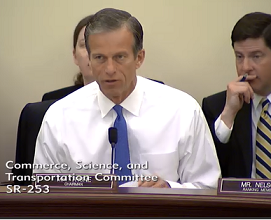Republican Senators Press Rosenworcel on E-Rate Expansion
Point to billions Congress has already earmarked for broadband, education

The smarter way to stay on top of the multichannel video marketplace. Sign up below.
You are now subscribed
Your newsletter sign-up was successful
Some top Republican senators are pressing Acting FCC Chairman Jessica Rosenworcel for more details on the FCC's proposal to open up its E-Rate broadband subsidy funds to home broadband service and devices, suggesting they are concerned about the viability of the overarching Universal Service Fund subsidy program.
Also Read: Charter, NCTA Emphasize Ongoing E-Rate Connectivity
They want to know how that E-rate expansion program--funded by taxes on consumer's telecom bills--dovetails with billions of dollars elsewhere allocated to remote learning by Congress, including for home service and devices.
In a letter to Rosenworcel Friday (Feb. 12), Sen. Roger Wicker (R-Miss.), ranking member of the Senate Commerce Committee joined by former Committee Chairman John Thune (R-S.D.), pointed out that if the FCC expands the E-Rate to allow funds for remote learning, rather than the current limit to devices and service in schools and libraries, it could create demand greater than the current available E-rate funding and thus increase that line item on consumer bills. They called that a regressive tax since the same charge is levied on rich and poor alike, citing a Government Accountability Office report to that effect.
Also Read: COVID-19 Aid Bill Includes $7 Billion-Plus for E-Rate
They point out that Congress has provided tens of billions of dollars for K-12 education already, some of it expressly for distance learning. Then there is the $3.2 billion Emergency Broadband Benefit Program in the December COVID-19 relief package that the FCC is in the process of standing up. "[T]he billions of dollars made available through the Emergency Broadband Benefit Program are intended to help connect families that could otherwise not afford broadband," they said. "Is there any reason to believe this program will fail to connect families with school-aged children? If so, please explain how E-Rate expansion could succeed where the Emergency Broadband Benefit Program fails."
Then there is the $7 billion-plus more for remote learning in the new COVID-19 aid bill currently being hammered out.
The smarter way to stay on top of the multichannel video marketplace. Sign up below.
The senators said they want to make sure that the FCC taps those billions before "increasing the burdens on the USF."
They asked Rosenworcel for answers, including on the following:
- "Has the Office of Economics and Analytics (OEA) calculated the amount of additional funding that would be required to support distance learning? Although the Public Notice anticipated that more funding would be required, it failed to estimate a specific figure. Has the Commission calculated the impact on the contribution factor if these petitions are granted? If OEA has not made this calculation, we ask that it be done and an answer provided to the Committee.
- "In order to constrain skyrocketing expenses, would funding to now-empty schools be reduced and redirected to their remote students? If not, please explain why the Commission continues to spend money on broadband to shuttered schools while expanding the E-Rate program to fund connections to students whose schools have not yet reopened.
- "The Centers for Disease Control and Prevention currently advises that schools may begin to reopen with certain safety precautions in place. The ongoing rollout of vaccines should also lead to schools reopening at a faster pace. If the Commission chooses to reinterpret Section 254 of the Telecommunications Act, how quickly do you anticipate the E-Rate program could be transformed to support spending for internet services outside of traditional classrooms? Additionally, how quickly do you anticipate the funding could be disbursed by the Universal Service Administrative Company, and students obtain access to broadband services in their homes? How would the Commission prioritize the funding and would schools that have safely reopened be eligible for the additional spending? Will a potential expansion of the E-Rate program meaningfully help manage the impact of the pandemic in a timely manner as schools reopen across the country? As this expansion is intended to respond to the COVID-19 pandemic, what is your plan for winding down this additional spending once the pandemic has been brought under control and students and teachers return to classrooms?
- "With the contribution factor climbing to an all-time high, are you considering safeguards such as a cap on the contribution factor to ensure that the burdens of these programs do not fall on those who can least afford them? If not, please explain how you would protect Americans from ever-increasing fees.
- "Given the inherent differences of providing service to students’ homes instead of classrooms, what rules would you need to implement in order to prevent waste, fraud, and abuse? Do you plan on following current Commission precedent of making any proposed rules available to the public prior to a vote?"
The senators want answers ASAP, but no later than Feb. 26.
Contributing editor John Eggerton has been an editor and/or writer on media regulation, legislation and policy for over four decades, including covering the FCC, FTC, Congress, the major media trade associations, and the federal courts. In addition to Multichannel News and Broadcasting + Cable, his work has appeared in Radio World, TV Technology, TV Fax, This Week in Consumer Electronics, Variety and the Encyclopedia Britannica.

